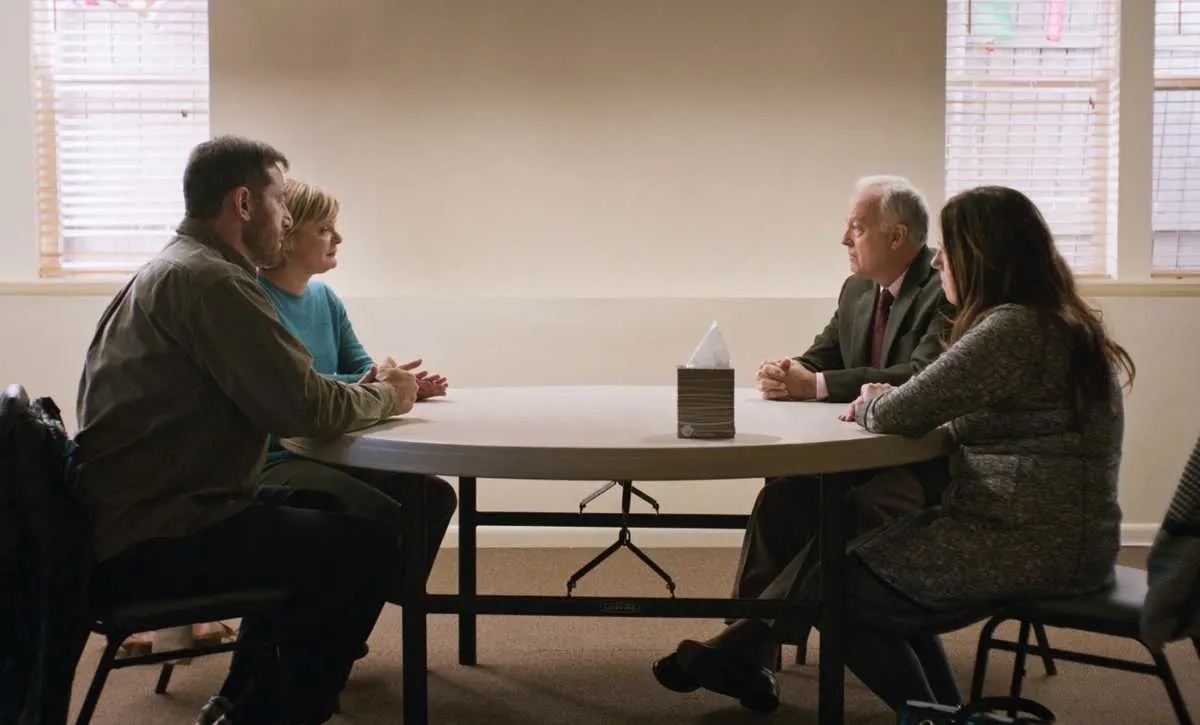
CGI explosions can certainly be fantastic, but taking talented actors, putting them on a set, turning on the cameras, the lights, and yelling “action” is the recipe for cinematic magic and what makes movies uniquely special. Such is the formula director Fran Kranz uses to create the heart wrenching Mass. The film follows two sets of parents, Richard (Reed Birney) and Linda (Ann Dowd), and Jay (Jason Isaacs) and Gail (Martha Plimpton) who are meeting years after a tragedy caused by Richard and Linda’s son Hayden against Jay and Gail’s son Evan tore all their lives apart. Mediated by Kendra (Michelle N. Carter) as an attempt to foster healing, Jay and Gail are finally ready to face what happened and speak directly to the parents of the boy who destroyed their lives in an attempt to move forward.
Mass is a moving display of the emotional aftermath of highly publicized tragedy; a raw look into what those who are left to pick up the pieces of their loved ones’ poor decisions are forced to wade through. When tragedies such as the one depicted in this film befall our nation we, understandably, focus most intensely on the immediate aftermath and those directly involved and affected. What would motivate someone to do this? Who are the innocents that were harmed? What could have been done to prevent this? But the thing about grief that many lose sight of is the fact that after some time passes and those that sought to console you immediately after a tragedy get back to their everyday lives, that’s when people are often hit the hardest as the pain lingers and the expanded company and support system they had dissipates. Being left with time for your mind to wander while still trying to come out on the other side can make the grieving process that much more arduous and this film is a powerful portrait of how it can be to find closure.
In examining the collateral damage and secondary victims of mass shootings, this film is above all else an exploration of its characters. Through them, we’re presented with just how heavy of an emotional toll this experience has on a person with each character wears different stages of grief on their spirit like a technicolor dream coat. Gail’s festering anger at Richard and Linda is palpable and always evident right there on the surface. Linda is clearly still depressed from the loss of Hayden and the guilt of what her son had done. Richard still harbors a modicum of denial and defensiveness over the role his family played in their son’s descent into madness and violence. As the session goes on, each seemingly go through many of the stages as they work out their years of feelings and pain. In their conversation, we learn the cost of holding onto grief, pain, and anger and the toll it can take on the human spirit and our capacity to live. Letting go of a love lost is one of the most difficult things for a person to do and many of us will never truly learn how to do so. But the burden of carrying that weight on our spirit and the catharsis of finding a path forward toward peace represents a need step toward fully healing. As Gail finds in the film, releasing one’s self from grief doesn’t mean forgetting those who are gone.
The entire cast nails the fostering of empathy for this emotional rollercoaster with fantastic performances with Ann Dowd leading the way with a powerhouse depiction of a mother wrecked by guilt trying to balance her own pain with trying to be cognizant and empathetic of the loss caused by the son she grieves. Jason Issacs is also great as is Martha Plimpton’s excruciating performance as a grieving mother weighed down by her anger and need to hold onto her son’s memory in the only way she knows how. Reed Birney’s wonderfully nuanced performance of a father in both pain and denial rounds out the stellar ensemble. Mass will be hard to watch for many and it is in no small part to how deeply this cast throws itself into these roles and makes real people out of the characters written in the script.
Fran Kranz’s decision to slowly unveil what exactly happened between their children in way where the subtext is readily apparent but the specific details are not was a brilliant choice in direction. He also makes the decision for an evenhanded depiction of who suffers when someone takes a life, not just the victims’ families, but the family of the perpetrator. The balance serves to make the emotional impact of the film and its themes that much stronger and challenging for viewers as they decide where their empathy lies. Instincts will tell many to blame Hayden’s parents, as Jay and Gail do, but seeing Richard and Linda lay bare their own struggles will force some to consider whom they extend sympathy and forgiveness toward. Mass is a heavy film that will require tissues for many who view it. The subject matter is tough to witness, but if such issues are tackled well, weighty movies like these can be enlightening, cathartic, and display the power and potential that art can have in shaping how we view and confront our world, which is what we have with this film. Mass is one of the more powerful films in recent memory and something definitely worth watching.
Image: Bleeker Street

